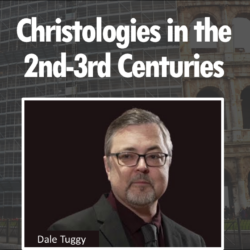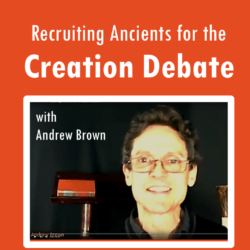 Are you curious how Dale Tuggy thinks he did on the Trinity debate with Michael Brown? In this post-debate interview I ask him about his strongest points as well as what he thought Brown’s strongest arguments were. I ask Tuggy about Brown’s Trinity theory and he explains the “one self” version of the Trinity as well as some of the major problems with that position. In the end, Tuggy both gave Brown a lot of credit for his rhetorical style while remaining completely unconvinced that Brown’s position can stand up to the bible or plain old logic.
Are you curious how Dale Tuggy thinks he did on the Trinity debate with Michael Brown? In this post-debate interview I ask him about his strongest points as well as what he thought Brown’s strongest arguments were. I ask Tuggy about Brown’s Trinity theory and he explains the “one self” version of the Trinity as well as some of the major problems with that position. In the end, Tuggy both gave Brown a lot of credit for his rhetorical style while remaining completely unconvinced that Brown’s position can stand up to the bible or plain old logic.
Stay tuned next time when Jerry Wierwille and I discuss Brown’s opening statement and give brief answers to his many opening arguments.
—— Links ——
- Visit Dale Tuggy’s website and podcast at trinities.org
- Check out Tuggy’s excellent YouTube video entitled, “Who Should Christians Worship“
- You can either listen to the entire debate on podcast 158 or watch it on YouTube
- Intro music: Jazzy Frenchy by bensound.com. Licensed under Creative Commons: By Attribution 3.0 License.







I have a question for Finnegan or Tuggy:
I’ve read Tuggy’s book and Standford entry. (I don’t want you to think I’m lazy!)
Do modalist, Oneself, Trinitarians believe that these three modes coexist? As in, Jesus is Jesus-god at the same time Father is being God and Spirit is being God? Or do they believe God moves from one mode into the other and back and forth? And could you also say same about Oneness Pentecostals?
Thx.
Hi Sean,
Thanks for the interviews. It was educational to hear from both sides about how they perceived the debate and the way things went for each side.
Though I disagree with Dr. Brown’s position and his “debate” style, I think he is right that the only fruitful debate format with someone like him is a format in which the exegesis of a limited number of scripture passages are debated.
Philosophical discussions are important and can be very fruitful if that’s where both sides are coming from; however, in my experience, what we saw with Dr. Brown is very typical of most Trinitarians. They rely on the authority of the text of the biblical cannon and “proof verses” (not even texts) to support their beliefs. They will hunker down on their favorite verses, claiming that their interpretation is “clear” and thus never engage at any other level. Thus, the best way to deal with them is to demonstrate why it is that they are reading the text incorrectly, offer better readings and solutions to tricky passages, nd most of all, demonstrate how each text supports the greater context. This takes time, persistence, and significant biblical language skills, which means it is not easy. But, in my opinion, it is the most effective strategy.
I am looking forward to hearing your response to Dr. Brown’s opening statement and hope you will challenge him at this level.
That was good to hear more of Dale’s thoughts in this interview to explain his thoughts. These are great… I hope Dale does more on his podcast to explain point by point some of his thoughts.
I agree with Sean Finnegan on that self-destructive principle he explained about Rome/war with regards to Brown. That’s about how I was thinking and how I generally think about most debates. Debates can be “won” by individuals who commit fallacies and proof-text all the time, but it’s not really winning if your own view makes no sense. This just tends to be how debates go. I still think White/Brown “won” the debate against Anthony Buzzard and Joseph Good… but there’s tons of problems with their explanations in the debate. Brown was unable to coherently explain his view without a contradiction or equivocation. He just tended to avoid it as you both pointed out. It’s even easier to hide one’s views(and fallacies) in words… if you write it down, it’s much more obvious.
My idea of Brown “winning” was more akin to the actual debate question, which was “Is the God of the Bible the Father alone?” It wasn’t really about the Trinity, though that’s clearly very relevant. Brown’s main point was to try to prove there’s others called “god/God” even if his view made no sense. He did that, and I don’t believe Dale answered them well. Again, also because of the short format and a wide topic there’s no way he could have answered the majority of them. Many people didn’t like even my debate length of 4 hours but that’s actually really short per person… roughly 2 hours to bring up everyone to speed on B.U. views when most have no idea of the scores of passages that show it. Dale had roughly 1 hr and 30 minutes to explain his views PLUS answer counter-arguments, that’s nothing in the scope of time it would take to explain tons of things like agency, prophecy, fallacies, contextual passages and more!
I also agree with your claim Sean that Brown seemed more interested in the jungle while Dale was using an overhead view. That’s a good visual description of why this debate didn’t seem to connect well because Tuggy and Brown were on different planes.
Although I found Brown tremendously annoying, I think you are somewhat unfair given the structure of the debate. The reason he had a stronger rhetorical position was that Tuggy was defending a particular theory. Brown was merely on the attack. His goal was to show that the “data”, in this case the Bible, was incompatible with Tuggy’s theory. You–and Dale to a lesser extent–want Brown to propose a positive theory so that you can go on the attack. I get that, since then Brown would be at the disadvantage, but that was not what Brown was about. I think that Brown is actually a mysterian: he doesn’t really know what the right answer is and is fine with not having one. It is coherent to argue that theory X is incompatible with the data even without presenting a rival theory Y. Unless the debate were structured differently, you can’t fault Brown for refusing to give you Y, which is what you really want.
Thank you, Dr. Tuggy, for being respectful about views other than your own. I thought one of the best statements of the debate was when you said, “I’m a unitarian, but I’m not an anti-trinitarian.” I appreciate this. I AGREE that it is important to know where our doctrine and our view of God come from. But I also know that there are a lot of people, on both sides of this argument, who have been saved by Jesus and who love him very much, and serve him faithfully.
I have two thoughts on what I’ve heard you guys say in this podcast.
1.) There seems to be some confusion about Dr. Brown saying, “the Son did not die.”
I think this stems from the fact that those who believe in conditional immortality and those who believe we are born with an immortal soul have different definitions of death.
As I am sure you are aware, for those who believe in an immortal soul, death means that the body dies; but the soul remains alive and awaits a bodily resurrection.
In this view, when it is said that Jesus died on the cross, it means only his body died. His soul – which is believed to be part of the eternal God – did not.
Dr. Brown said something to the effect of, “Jesus died, but the Son didn’t.” I think what he meant was Jesus’ body died on the cross, but his soul (which Dr. Brown is calling “the Son”) didn’t. He was saying “the Son” as in the pre-existent part of Christ, the second person of the trinity. Others might have just said, “Jesus’ soul, which is God, didn’t die.” This is why Dr. Brown was emphasizing that Jesus said, “Into your hands, I commit my spirit.” He was pointing out that Jesus’ spirit (soul) was going to leave his body when the body ceased to function.
Dr. Brown wasn’t talking about Jesus having two personalities or a fake death or anything like that. I can assure you he believes that Jesus, as a man, died on the cross to make atonement for sin.
2.) I understand what you guys are saying about the church fathers not being proto-trinitarians or having the same understanding of God as today’s orthodox definition. Still, in reading their works, it is difficult to deny that they believed the church taught that Jesus is God and man.
It seems that you guys don’t give the same weight to the idea of Jesus’ deity as you do to the trinity. I am guessing this is because you are more focused on combatting the argument, “The trinity has always been a part of church belief,” than on the argument that, “Jesus’ deity has always been a part of church belief.” Perhaps you believe that, if the orthodox view of the trinity is proven false, then we can easily say that early Christians believed as you believe.
With all due respect, I don’t think it works that way. Even if the early Christians were more modalist or had a one-self view of God, if they believed that Christ was God in the flesh then they would not have supported the Biblical unitarian viewpoint.
And, in fact, we have documentation that they didn’t support the Biblical unitarian viewpoint.
Tertullian is quoted in his work, “Against All Heresies,” chapter VIII, as saying:
“Add to these Theodotus the Byzantine, who, after being apprehended for Christ’s Name, and apostatizing, CEASED NOT TO BLASPHEME against Christ. For he introduced a doctrine by which to affirm that Christ was merely a human being, BUT DENY HIS DEITY; teaching that He was born of the Holy Spirit indeed of a virgin, but was a solitary and bare human being, with no pre-eminence above the rest (of mankind), but only that of righteousness. After him brake out a SECOND HERETICAL THEODOTUS…”
Eusebius of Caesarea in “The Church History,” Book 5, #27 and #28 is quoted as saying:
“Finally, there are many other orthodox writings, as is clear from their interpretations of the divine Scripture, but the authors are unnamed and unknown. A treatise by one of these against Artemon’s heresy, which Paul of Samosata has tried to renew in my own time, applies to the historical period under discussion. He [the author of the treatise] refutes this heresy, which asserts that the Savior was merely human, as a recent innovation, since those who introduced it TRIED TO MAKE IT RESPECTABLE by claiming it as ancient….”
Eusebius of Caesarea then quotes some of the treatise:
“They claim that all their predecessors and the apostles themselves taught what they do and that the true teaching was preserved until the time of Victor, the thirteenth Bishop of Rome after Peter, but that the truth has been perverted from the time of his successor, Zephyrinus. Their claims might be credible if the divine Scriptures were not opposed to them. And Christian writers before Victor also defended the truth against both the pagans and the heretics of their own day – I mean the works of Justin, Miltiades, Tatian, Clement, and many more, in all of which CHRIST IS TREATED AS GOD. For who does not know the books of Irenaeus, Melito and the others who proclaim CHRIST AS GOD AND MAN or all the earliest psalms and hymns that sing of Christ as the Word of God and REGARD HIM AS GOD? When the church’s understanding has been proclaimed FOR SO MANY YEARS, how then is it possible that Victor’s predecessors can have preached as these people claim? Are they not ashamed of slandering Victor in this way when they know well enough that he excommunicated Theodotus the shoemaker, [the same Theodotus Tertullian mentioned] the father of this God-denying apostasy, when he first said that Christ was merely human? If Victor’s attitude toward them was as their blasphemy teaches, how could he have ejected Theodotus who invented this heresy?”
You can, of course, disagree and argue that these men were wrong in their beliefs. But you can’t make them supporters of Biblical unitarian beliefs.
1. So, if we agree that the “soul” (or God part) of Jesus did not die (and only the “human part” dies), then why is it so important that the atonement be divine (which is no where expressly stated but is a huge part of current Trinitarian belief—and Brown’s explicit statements)?
2. There were BU prior to Subordinationists. Tuggy, and other current folks, discuss these extensively. You might appreciate Kegan Chandler’s book which carefully documents platonic and gnostic influences on the deification of Jesus.
Candace, thank you for your reply!
In answer to your question above: I agree that Scripture does not state the atonement needs to be divine. The common answer for why this is believed is: Only an infinite being could pay for an infinite number of sins. (I can’t remember but I think the basis for that belief was addressed in this podcast….or one of the more recent ones. 😉 ) I personally don’t think this is a well founded argument for Christ’s deity. I think there are better ones.
As for your #2 above, I’ve had Kegan’s book for a few years. And I recognize that he makes an argument for the Nazarenes in Judea (just after Jesus’ death) being the original Jewish
Christians. I will look into this more. It is difficult, at times, to know how to look at things because just like there is not a consistent history of Trinitarian theology, there is also not a consistent “Biblical unitarian” theology. And, when investigating the matter, we are given different narratives by different people – depending on their theological bent and their chosen scholars. We are left to decide – with God’s wisdom – who, and what version of the story, to trust. I just hope to honor God with my choice – as I’m sure you do, too. 🙂
Thanks again!
Dale Tuggy admits (03:30 and on) that he made a blunder when, in his opening statement, he “conceded that Jesus pre-existed”. From here to affirming, as Justin Martyr did, that the Old Testament shows that “there was another God and Lord”, “holding second place”, it is an almost inevitable step.
Once Dale Tuggy had made that clumsy concession, it was almost inevitable that Michael Brown had room to roam freely, because (as I have repeatedly warned Dale Tuggy, but whe won’t heed), if you want to keep affirming the One God of the Biblie, either you end up in “Biblical Unitarianism” (the modern name of the heresy of Theodotus the Tanner – as the quotations provided by Jenn amply confirms), or you settle (after going through the sequence: pre-existence => second god => eternal generation => Arian crisis => homoousios) for the fully fledged (co-equal, co-eternal, tri-personal) “Trinity” of the Cappadocian scoundrels.
There is another way, the way of the logos, essential attribute (“hand” – together with the other “hand”, God’s pneuma – see Deut 33:27; Ps 33:6) of the One and Only God, the Father Almighty and of the incarnation of God’s logos (John 1:1,14 – which is just presented in a different, more specific way in Luke 1:35). For some reason which I cannot fully explain, the Conciliar Fathers at Nicea (325 CE) chose not even to mention the logos in the Creed, even though (unlike the homoousios) it was fully scriptural. Not only, it was an integral part of the draft of creed that Eusebius of Caesarea had brought with himself at Nicea, but was discarded.
Hey, sorry I am super late to the show, just discovered Restitutio within the last month.
My comment is in response to Sean’s question if the trinitarian view is dangerous?
This is something I have been asking God about personally and just got an answer yesterday while driving home from work.
It may not be dangerous as a salvation issue, but it is a problem because they attribute Jesus for EVERYTHING God has done, especially with things in the old testament before Jesus even came onto the sceen. They essentially eclipse God with Jesus. You can hear it in most of the Christian songs on the radio. I think we need to be careful of who we glorify for what has been done. We praise, worship and glorify Jesus for what he did in the new testament and by doing that we glorify the Father because He sent him for that purpose. Jesus did not receive his glory until AFTER he was resurrected. But we need to be sure to glorify the Father for everything that was done before Jesus, I think it is dangerous (and confusing) to intermix the two.
Heather, I agree! By collapsing Jesus and God together, it seems that either of them are no longer in view and I think this is dangerous. Even Trinitarians separate God and his Son when they pray: “In Jesus’ name”. Why would we pray to Jesus in Jesus’ name? I also want to add that if God wanted to reveal himself as triune…why didn’t he just do it in scripture? Why is the Bible written to make the most simple reading show the there is a God we call Father and he sent his Son to save us? To a human mind, father comes first then son…which means they are not the same being. Why did it take nearly 400 years to “reveal” a trinity? If someone believes that God continued to reveal himself after the Bible was canonized, then when did God stop? Maybe he is continuing to reveal that, hey, you guys got it wrong. I really am a single self and I really did appoint a human being to be your Messiah and I really did exalt this man to sit at my right hand in heaven.
Anillationism is the Achilles heal of Trinitarianism. Since humans die and are truly dead and are not immortal souls then 💔 then Yəhoshu’a HaMashiach died and was dead. This gives an Anthropology of the son of יהוה as not being an incarnation but of possession of this imagined pre-incarnate son of a triune-god [a 3 person, no name, non-self, entity]. The Satanic lie that death is not true but all become “gods” with immortality. Yeshu’a anointed died and was dead and his Father raised him from the dead. An accurate Anthropology demands it. Our Master is a man not Elohim as attested by our Master himself (Jn 8.40).